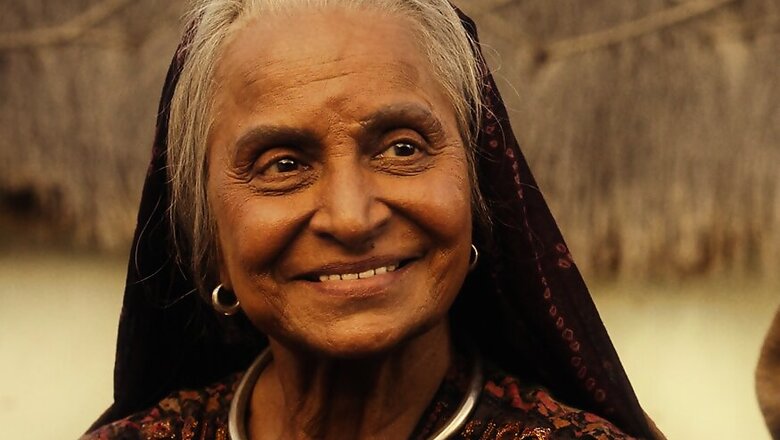
views
Internationally acclaimed director Anup Singh’s latest film – The Songs of Scorpion saw a huge response when it was recently screened at the Locarno film festival and MAMI. This modern-day cinematic folk tale that features the effortless Irrfan Khan and Iranian actor Golshifteh Farahani will also see legendary actor Waheeda Rehman acting after eight years. The Songs of Scorpion will revolve around scorpion singer Nooran played by Golshifteh Farahani, and how she draws out Scorpio’s venom through a song that Nooran learnt to sing from her grandmother. Rehman will be seen playing the grandmother’s role and Irrfan as the camel rider in this film set in Thar Desert of Rajasthan. While talking to News18.com, Singh describes his experience of shooting with Waheeda Rehman – both on and off screen along with unveiling different layers of the film. Excerpts:
What made you cast legendary actress Waheeda Rehman in The Songs of Scorpion. Describe her character sketch and how easy was it to cast her for the film
The Song of Scorpions is a film about poison and song. In our world, today, we seem to be breathing in poison with almost every breath we take in, the poison of bigoted politics and violence all around us. In response, we can make a choice: when we breathe out, do we want to breathe out the same poison that we breathed in? Or is it possible that we could, instead, breathe out a song and perhaps bring a healing to our poisoned world? Waheeda ji’s character in the film embodies the film’s primal theme: our choice to heal. Her character holds my deepest beliefs and hopes.
Obviously, for this role, I needed an actress whose very presence and every gesture would give breath to this secret source of the film. Once I started thinking of the casting, Waheeda ji kept recurring in my thoughts. The vivacious gentleness and insight with which she looks at you, the dancer’s grace of her movements were very important to me – she’s like the incarnation of a song of yearning that we all carry within ourselves. The song that fills us with the desire to live more fully.
I knew that she had not been accepting any role for almost 8 years. But, I was lucky that she had seen Qissa and liked it very much. She asked me to tell her about the role. I said to her that the role was about a woman who, when she sang, could bring flowers to bloom in a desert. And that was enough! Her imagination immediately understood the role and she said, “Yes”!
In fact, she was so excited by the idea that she even agreed to sing one song for the film. So, for the first time in her whole career, we’ll hear Waheeda ji singing in her own voice in The Song of Scorpions.
Tell us more about the genre, mood and feel of the song that she’ll be singing in the movie.
My film is set within the Sindhi Muslim community of Rajasthan. The women of this community, as in many traditional communities, have a song for every occasion, every festival, and every ritual. Madan Gopal Singh, the lyricist and writer of the song, took the tone and celebratory energy from this tradition of singing. This is a song that seeks to heal a sick child.
It is a jubilant song. It talks about the exuberance and power of nature and life. It tells the child that she has within her the same boisterousness and vigor of life. It tells her that her illness will pass just as the life-giving force of rain makes us forget the burning barrenness of summer.
Waheeda ji sings just the first stanza of the song in the film, but she sings it with such love and belief in her power to heal that it fills us with a new joy and trust in life. Of course, when we finally release the music album of the film, we’ll all have the opportunity to hear the full life-giving power of the song!
When a senior actor like her is working with talented actors such as Irrfan and Golshifteh, what sort of an equation and chemistry do they end up sharing?
A sudden excitement and a smile would animate Waheeda ji as soon as she saw Golshifteh making her way to the set. And we would see exactly the same excitement in Golshifteh whenever she saw Waheeda ji. Golshifteh would jump up from wherever she was, in the middle of make-up or even half-dressed in her costume, and she would run like a little girl to go and hug her grandmother, almost bowling both of them down the dunes with the force of her embrace. Golshifteh would get Waheeda ji water and tea, ply her with fruits, cover her with a shawl when it started getting cold and scold her if she refused to rest between shots.
If they were doing a shot together, they would almost always begin with Golshifteh somehow sitting in Waheeda ji’s lap Both of them understood that their relationship within the film was like that between a melody and words in a song, that they were separate yet one, each bringing force and beauty to the other. Both are accomplished actors and Waheeda ji would help Golshifteh with the pronunciation of certain Hindi words and Golshifteh would gently comb Waheeda ji’s hair with her fingers or help her adjust her costume after each take. The love, regard, respect on the set created a vibrant tenderness between these two characters in the film. Their affection and intimacy became palpable and brought many deeply moving, magical moments to the film.
What about casting Iranian actor Golshifteh Farahani to Hindi industry’s renowned actor Waheeda Rehman?
Well, Golshifteh came to see Qissa at one of the international film festivals and for the next few days Irrfan, she and I spent as much time together as possible talking about films and acting. Golshifteh lives in exile from Iran and her each breath is intensely marked by the pain of separation from country and family. Wherever she lives now, she’s an outsider. But instead of allowing this loss of identity to embitter or limit her, she has chosen to create multiple other possibilities of herself. Painfully, often traumatically, but always passionately, she is always creating herself anew. This creative passion is precisely what drives Nooran, the female protagonist of The Song of Scorpions. The more time I spent with Golshifteh, the more I learned about Nooran. Very soon, then, I narrated my script to her and she said ‘Yes’ immediately.
What brief did you give to Irrfan, Golshifteh and Waheeda?
Irrfan plays a camel trader in the film and there’s something of the beast about this character. However, when the character hears Nooran sing, she lights a desire in him to become a better person. The character’s desperate, heart-breaking struggle to rise above his animal nature, I told Irrfan, is what the role is really about. How he grows from almost an animal to a man ready to die for his love. Irrfan saw the challenge immediately and brought such a profound yearning and fragility to the character that his performance continues to surprise me even after watching the film a 100 times or more.
With Golshifteh, it was sheer luck that early one morning in the first few days of the shoot, we saw a young deer running in the desert. We sat down on the high sand dune where we were and watched the deer together. The deer could not have been more than two weeks old. We saw it staggering-leaping about and then it suddenly stopped. Its head cocked, listening to the universe. It was still, unmoving, but its whole body quivering with its new life. And, then, in a snap, it was off again, staggering-running through the desert and then it disappeared. Golshifteh and I turned to look at each other. It was a magical moment, the desert had given us a gift. We both understood immediately that this was the energy and quality of movement that we were looking for in the film’s character, Nooran. That she should be like this new-born deer, so full of life that even when she’s not moving, she is quivering with the beating blood of life. And that’s what Golshifteh has finally brought to the film, a passionate, flaming celebration of life.
Waheeda ji is such an experienced actress that sometimes just a certain look that she catches from a director is enough. At the very beginning of the shoot I told her just one thing and that was enough for her for the whole shoot: I said to her, “Waheeda ji, every time you breathe out in this film, we should feel that you’re breathing out a song.” She understood that immediately and, really, her performance in the film is just that, a song.
What was your learning after spending time and working with Waheeda?
When Waheeda ji comes on the set, she has a smile, a greeting, a special word for every one on her way, whether it be the spot-boy or the camera-man. She made time for everyone. The purity and gentleness of her gaze would bring a concentrated, almost reverential hush to the set. It’s almost as though with her presence the set had become sacred. Without anyone really noticing, we were all enlivened and ready for the day’s work.
And once the work started, there was no stopping her! She would rush off to the top of a dune, out of breath, but refuse to rest. “No, the light’s perfect now. If we wait, we’ll lose it. I’m ready. Let’s take the shot!” And even when it was not her shot, she would be there to watch and support her co-actors. Her simple words of greeting, her equal respect for every one on set helped to create a tremendously hard-working and jovial unit. It brought us all together. Her dedication, charm and graciousness had all the film unit, be they Indian, Swiss or French, in awe. We all wanted to be worthy of her. Her enthusiasm and resoluteness encouraged each one of us to push way beyond what we thought was our best and to keep seeking what might be even better.
We all learned from her the simple lesson that respect for each other could inspire us as a group to overcome any challenge. She made the shooting of The Song of Scorpions one of the best work experiences for all of us. Even today, the Swiss crew talks about her with awe. Irrfan often says this was the best shoot he’s ever had.
The film was shot in Rajasthan which appears as a character in the film? What role does a city play in any film?
The desert can be very cruel, but if you search, then deep within, it holds water. Saints, poets, prophets and lovers have lost and found themselves in the desert. So many of the world’s religions, poetry and music and love-legends have been found in the desert. Within the Sufi tradition, the desert is seen as a harsh mentor. It can burn you to dust, but it can also open you to an awareness of the oases that you might hold within you. When you watch the film, I hope all these resonances and evocations the desert has will help you relate to and understand the characters, their story and the film much more intensely.
Any particular anecdote from the film set that you want to share?
Waheeda ji will not like my mentioning this, but on her last day of shoot, she had a personally chosen gift for every one of the cast and crew. When I say every one, I mean every one. She had shopped for every item herself in the markets of Jaisalmer. As though that was not enough, she had me in tears when she left a generous part of her fee for the film to be distributed equally to the light-boys and spot-boys.
















Comments
0 comment